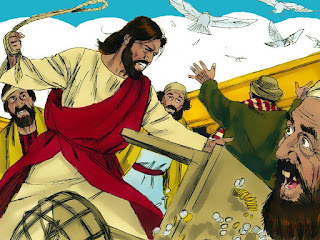The Business of Worship
This sermon was given at our Zoom service on Sunday 7th March - the third Sunday of Lent, a few weeks' before our planned return to our church building. The Gospel was John 2:13-22.
It’s odd to hear today’s Gospel story – the story of Christ clearing out the Temple – when we ourselves are not in our own church building. Were a preacher giving this sermon twelve months ago, they’d probably attempt to provide comfort and reassurance to a worried congregation about to move into a year of virtual worship by preaching something along the lines of the church being the people, and not the building, and making a link back to the destruction of the temple that Christ foretells in this gospel.
But we’ve been worshipping virtually for many months now, and… God willing… it looks like a return to our beautiful building is in sight. As such, we all know more than ever before that the church is the people, but even those of us who have long fervently held the belief that the ‘where’ of worship matters little compared to the ‘who’ and the ‘what’ must surely be looking forward to that return, having found that we have missed elements of a physical space we never necessarily thought we would. No – we know all too well the loss felt by the temple-destruction. Today’s sermon must be about something different.
Perhaps then, I could focus on the actual clearing of the temple? I am hosting this Zoom worship today, after all! With one click of my finger, I could end the service right here, and cast us all out into the virtual ether… Perhaps not.
That’s not, of course, what the clearing of the temple was about. Christ didn’t chase out the worshippers; instead, he chased out the business that had grown around the worship; the people selling the animals for sacrifices, and the people selling the temple coinage so that worshippers could buy those animals within the temple (worldly coins being too tainted to be spent inside that holy place), and – of course – clearing out all that money that was being made in the lucrative business of allowing people to access their God.
But Jesus was not naïve. He was not some country yokel who rocked up one day only to be immediately shocked by the system and fly off the handle. He knew how the temple operated. This was how the business of religion was done, and had been done for many years. Christ was angry, yes… but it was planned. How do we know? Well, for one thing, he brought a whip.
Christ turned up that day with the *aim* of turning the tables. Literally. He turned up knowing how things were done, and knowing that he was going to make a change. He came to put an end to the business of worship, in order to allow the people to actually worship. His prophetic act here points to his death and resurrection, killing the business of worship there on the cross and splitting the temple curtain in two, opening God’s presence to all.
We have all built up a business around worship. It may not be monetary, but it’s there. We’re human, after all; and being human, we are creatures of habit. What we start doing because we find it helpful soon becomes routine and then ritual, doing things for their own sake, or because that’s Just What We Do – business; business as usual; BAU. I don’t know if you know the Matt Redman song, ‘Heart of Worship’? The song was written after Matt realised his focus in worshipping God had moved away from God and towards playing and singing the worship songs themselves. The worship songs had become the BAU, and the business of singing had overtaken worship. These very things that are meant to help us worship our Creator can sometimes prevent us from doing so.
I have not enjoyed lockdown. I do not think this time was engineered by God, but I *do* know that God can, and does, use situations not caused by him for his glory. Some of our previous ritual has been stripped away, and – soon – we will be fortunate enough to regain what we have for so long lost. It is my prayer that in coming together again, and partaking in communal worship, we will not too hastily return to that business of worship that the longevity of lockdown has cleared from our lives. I pray that we will rediscover, or even discover anew, our reasons behind our rituals, and the worship we find in our regained habits. I know where once I may have trudged my way to church on a Sunday morning, that the next time I walk that path will be in itself an act of worship; where once I may have entered into the building in a last-minute rush to get settled before the service, that the next time I put on my cassock and reader’s scarf or sit in the pew whilst the organ plays will be an act of spiritual preparation, and the next time I find myself in Church Croft, putting some coins in the tin for a cup of tea after the service will be an act of incredibly joyous thanksgiving.
Our temple has been cleared for nearly twelve months now, and hope is on the horizon. As we navigate our way through Lent, and look towards Easter, let us never forget, just as Christ prophesied, though cleared, and seemingly destroyed, God’s temple is rebuilt; Christ’s resurrection does away with the business of worship – so come, let us worship.
Amen


Comments
Post a Comment